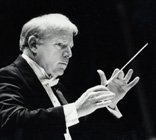PROMS 2002
PROM 69: Rakhmaninov, Piano Concerto No. 2 in C minor, Shostakovich Symphony No. 8, André Watts piano, BBC Symphony Orchestra, Leonard Slatkin, RAH, 10th September 2002 (AR)
American pianist André Watts returned to the Proms after a break of 15 years to play Rakhmaninov's popular Second Piano Concerto. This work has long been associated with the fortiesā film Brief Encounter and listening to it under Slatkinís baton it certainly sounded like quintessential film music.
Watts opened the work in a rather heavy, plodding manner and seemed merely mechanical, going through the motions, with the conductor and orchestra filling in, like painting-by-numbers, and sounding more like background muzac. This was the worst performance I have ever encountered of this over- played concerto, and not nearly brief enough. It was passionless, soulless and totally anaemic. In the slow movement Wattsí playing was curiously clinical and unmoving, whilst the woodwind solos were dull and bland, totally lacking poetry and passion. Watts zoomed through the last movement as if he had another gig to get to. I legged it before the pianistís obligatory encore.
The Shostakovich 8th Symphony never ignited. The first movement, marked Adagio - Allegro non troppo, completely lacked tension and onward thrust. Slatkinís tempi were slack and he lost the pulsating thread of this potentially moving movement. Whilst the string playing was rather sedate and subdued, it lacked grain and grit which are essential ingredients for the dark Shostakovich symphonic style and sound. The BBC SO strings are in urgent need of replenishment, and just plain oomph - they seemed so thin and meagre and starved of sound. The fine Cor Anglais solo which ended the interminably long movement had a distilled melancholia - and was the only distinguished and memorable playing of the entire evening.
Shostakovich described the second movement as "a march with elements of a scherzo". Slatkin obviously thought otherwise and ignored the marshal element, playing it straight, as he did the third movement which also utilises a militaristic metaphor as a threatā progressing to an hysterical climax (a device Mahler had used in his 3rd, 5th and 6th symphonies). Slatkin totally fudged this, toning down the percussion section at times when they should have had a nerve-shattering effect, rendering them instead limp and flaccid.
This work was quite simply under-rehearsed. Instead of his Barbirolliesque cavortings, Slatkinís energies might have been better deployed getting more drama out of his players. The woodwind were shrill and coarse, and the brass were crude and messy. The timpanist might as well have stayed at home, so noncommittal and at times inaudible were his playing. The fourth and fifth movements were bland beyond belief and the closing passages were not only sabotaged by the conductor and apathetic orchestra but also by a distant mobile phone.
Having the cherished memory of Paavo Berglundís deeply moving account of the Shostakovich 8th with the London Philharmonic Orchestra played with a Russian accent (dark and grainy), Slatkinís reading seemed slack and superficial - a non-event that never happened. Slatkin, as their Chief Conductor, needs to give the BBC SO a sound-lift to get the Shostakovich style: they simply cannot play Shostakovich with an English accent: the result is rather like listening to Edward Heathís ludicrous attempts to speak French.
An evening to forget.
Alex Russell

 Return to:
Return to: